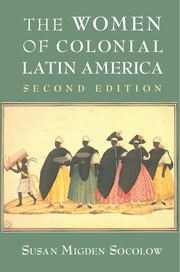Book contents
- Frontmatter
- Dedication
- Contents
- List of Figures
- Acknowledgments
- Introduction: Why Women?
- Chapter One Iberian Women in the Old World and the New
- Chapter Two Before Columbus: Women in Indigenous America and Africa
- Chapter Three Conquest and Colonization
- Chapter Four The Arrival of Iberian Women
- Chapter Five Women, Marriage, and Family
- Chapter Six Elite Women
- Chapter Seven The Brides of Christ and Other Religious Women
- Chapter Eight Women and Work
- Chapter Nine Women and Slavery
- Chapter Ten Women and Social Deviance
- Chapter Eleven Women and Enlightenment Reform
- Conclusion
- Documents
- Suggested Further Reading
- Index
- Plate section
- References
Chapter Six - Elite Women
Published online by Cambridge University Press: 05 February 2015
- Frontmatter
- Dedication
- Contents
- List of Figures
- Acknowledgments
- Introduction: Why Women?
- Chapter One Iberian Women in the Old World and the New
- Chapter Two Before Columbus: Women in Indigenous America and Africa
- Chapter Three Conquest and Colonization
- Chapter Four The Arrival of Iberian Women
- Chapter Five Women, Marriage, and Family
- Chapter Six Elite Women
- Chapter Seven The Brides of Christ and Other Religious Women
- Chapter Eight Women and Work
- Chapter Nine Women and Slavery
- Chapter Ten Women and Social Deviance
- Chapter Eleven Women and Enlightenment Reform
- Conclusion
- Documents
- Suggested Further Reading
- Index
- Plate section
- References
Summary
The marriage arrangements of the wealthy are usually such shameful [economic] pacts that they should take place in the Consulado [Merchant’s Guild] because of their economic content, than in the church because of their religious content. Instead of the desires and compatibility of the bride and groom, the first thing that is looked at is money.
Although elite women were by definition a small, select group, they played important social and cultural roles and were intimately involved in the transmission of status and property and elite strategies of survival and recruitment. Honor, on both the personal and family levels, was of central concern to the elite and those who hoped to join its ranks. In the eyes of the elite, honor was linked to social standing and to virtue. To be honorable, the Hispanic social code called for women to be pure and sexually beyond reproach, publicly discreet, and timid in their behavior. A woman who failed to fulfill these norms was shameless. Her conduct defiled not only her own honor but also that of her husband and her family. This code linked the protection of a woman’s honor to that of her kin and their present and future claim to an exalted social position and required that women be watched over by men.
Because the ideal elite woman was to be virginal before marriage and chaste afterward, her sexuality, activities, and education were closely supervised. Elite girls were brought up out of the public’s sight, and left their homes only to go to mass. They were raised to respect and defer to their parents, especially their fathers. Their parents stressed the Hispanic honor code, which tied female sexual behavior and woman’s virginity to her family’s honor. A young woman was also taught to have her family’s economic and dynastic interests at heart. These standards of behavior affected every elite woman in colonial Latin America for she was a woman, part of a family, and a member of the local elite.
- Type
- Chapter
- Information
- The Women of Colonial Latin America , pp. 84 - 96Publisher: Cambridge University PressPrint publication year: 2015



